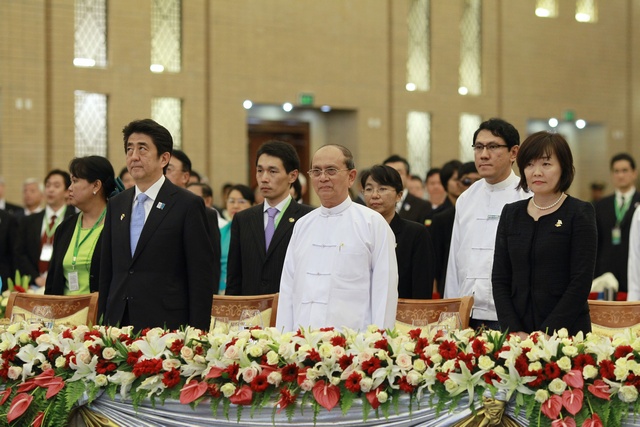Japan’s foreign minister, Fumio Kishida, will meet his Burmese counterpart, Wunna Maung Lwin, as well as President Thein Sein and opposition leader Aung San Suu Kyi during two days of political and economic talks beginning on Monday.
Kishida arrived in Rangoon on Sunday night and is expected to restate Japan’s support for democratic reforms, as financial aid and investment continues to be bolstered.
According to a Kyodo-based news agency, the Japanese delegation will announce a fresh 8 billion yen (US$78.5 million) package for hospital equipment and health-worker training.
Japan is the largest foreign aid donor to Burma — having pledged US$1.5 billion in the time since Prime Minister Shinzo Abe took office in December 2012. That aid has been coupled with direct business investment as Japanese firms look to enter the bourgeoning Burmese manufacturing sector, increasingly focusing on Special Economic Zones (SEZs) on Burma’s coastline south of Rangoon.
Japan has played a strong role in the development of SEZs across Burma, with the Japan International Cooperation Association (JICA) advising the Burmese government as they legislated for the deregulated zones.
Last month Japanese car manufacturers Mitsubishi, Suzuki and Toyota all lodged bids to operate in Thilawa SEZ, outside of Rangoon, encouraged by the relaxed investment regulations which will characterise the business hub.
The move was criticised, however, by local NGOs, including the Karen Environment & Social Network, which said that local communities have been frozen out of the economic fact-finding process and now risk exploitation as foreign businesses are encouraged to take advantage of the low wages on offer at the SEZs.
SEZs under construction in Dawei in Tenasserim Division and Kyaukphyu in Arakan State have also stirred controversy with local and international rights groups repeatedly reiterating concerns as to the potential for workplace exploitation.
Japanese investment in Burma stood at over US$300 million at the end of 2013, making it the tenth largest investor in Burma. China remains the largest, having invested over US$14 billion since 1988.
[related]



